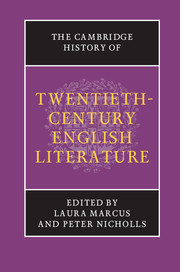Book contents
- Frontmatter
- Introduction
- PART ONE WRITING MODERNITY
- PART TWO THE EMERGING AVANT-GARDE
- PART THREE MODERNISM AND ITS AFTERMATH, 1918–1945
- 10 Trauma and war memory
- 11 The time–mind of the twenties
- 12 Modern life: fiction and satire
- 13 Modernist poetry and poetics
- 14 Modernity and myth
- 15 Psychoanalysis and literature
- 16 Biography and autobiography
- 17 ‘Speed, violence, women, America’: popular fictions
- 18 Theatre and drama between the wars
- 19 Literature and cinema
- 20 The thirties: politics, authority, perspective
- 21 Literary criticism and cultural politics
- 22 Surrealism in England
- 23 World War II: contested Europe
- 24 World War II: the city in ruins
- PART FOUR POST-WAR CULTURES, 1945–1970
- PART FIVE TOWARDS THE MILLENNIUM, 1970–2000
- Bibliography
- Index
- References
13 - Modernist poetry and poetics
from PART THREE - MODERNISM AND ITS AFTERMATH, 1918–1945
Published online by Cambridge University Press: 28 March 2008
- Frontmatter
- Introduction
- PART ONE WRITING MODERNITY
- PART TWO THE EMERGING AVANT-GARDE
- PART THREE MODERNISM AND ITS AFTERMATH, 1918–1945
- 10 Trauma and war memory
- 11 The time–mind of the twenties
- 12 Modern life: fiction and satire
- 13 Modernist poetry and poetics
- 14 Modernity and myth
- 15 Psychoanalysis and literature
- 16 Biography and autobiography
- 17 ‘Speed, violence, women, America’: popular fictions
- 18 Theatre and drama between the wars
- 19 Literature and cinema
- 20 The thirties: politics, authority, perspective
- 21 Literary criticism and cultural politics
- 22 Surrealism in England
- 23 World War II: contested Europe
- 24 World War II: the city in ruins
- PART FOUR POST-WAR CULTURES, 1945–1970
- PART FIVE TOWARDS THE MILLENNIUM, 1970–2000
- Bibliography
- Index
- References
Summary
Between the 1830s, when the words ‘cliché’ and ‘stereotype’ were coined as technical terms for cheap and unchanging page-casts of type – the revolutionary publishing technology that would put a newspaper in every home – and the 1890s, when ‘cliché’ acquired its figurative sense of a stock or hackneyed expression, the first wave of a literary revolution with deep social and philosophical roots shook the foundations of European poetics. Like painters rebelling against the expectations of an audience smitten with the easy verisimilitude of photography, poets revolted against the way that mass journalism habituated a vastly enlarged European reading public to a glib utilitarian rationalism that short-circuited complex thought and feeling. In the words of Ezra Pound (who spoke for the second wave of that revolution), ‘the newspaper criterion that “an article must run straight through from start to finish”… is almost pure kinesis designed not to make the reader think, but to make him accept a certain conclusion’. ‘Literature and philosophy’, he added, differ by a need to ‘constantly diverge from this groovedness, constantly throw upon the perceptions new data, new images, which prevent the acceptance of an over facile conclusion’. Between the two, Pound concluded, there was a ‘war’, and if newspapers won the war Europe would find itself in ‘an order of things in which there would be no art, no literature, no manners, no civilisation’. The battleground on which this war was waged was the cliché, and the stakes involved not just style, but what Pound calls here ‘civilisation’ and elsewhere ‘life’.
- Type
- Chapter
- Information
- The Cambridge History of Twentieth-Century English Literature , pp. 232 - 250Publisher: Cambridge University PressPrint publication year: 2005

